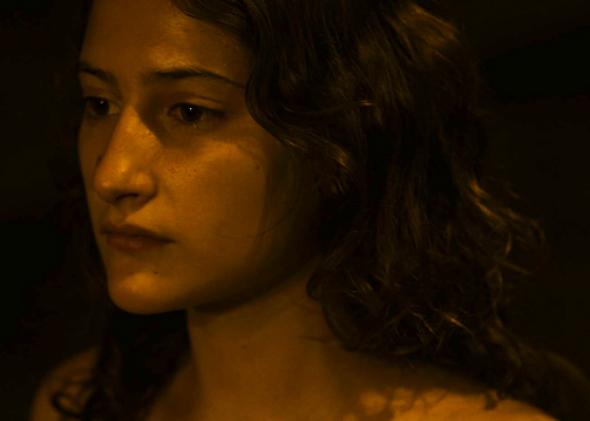Claire Denis makes a neo-noir thriller. That idea alone was enough to get me excited about Bastards, the latest from this brilliant if sometimes maddeningly opaque French writer-director. Denis doesn’t often take on anything like a genre film, but she’s consistently drawn to stories that plumb the murkiest depths of both human relationships and social institutions, often (as in her last feature, White Material) focusing on the ravages wrought by French colonialism in Africa. Denis’ pitiless gaze seems appropriate when trained on the particularly scuzzy underworld explored in Bastards, a pitch-dark policier loosely based on a real-life Paris sex-ring scandal.
Like many of Denis’ films, Bastards takes its time coalescing into anything like a coherent story. It opens with a series of moody, often dialogue-free vignettes, introducing a series of characters whose relationship to one another is at first unclear. A beautiful teenage girl (Lola Créton) walks down a rain-slick Paris street at night, naked but for a pair of high heels and seemingly in shock. A ship’s captain, Marco Silvestri (Vincent Lindon) abandons his ship to investigate the suicide of his brother-in-law, whose widow (Julie Bataille) insists her husband’s death was connected in some way to a nefarious billionaire financier, Edouard Laporte (a quietly terrifying Michel Subor).
It’s after Marco resolves to stay in Paris for a while and help his distraught sister with her affairs that these threads begin to weave together (though Bastards could at no point be accused of an excess of clarity—Denis likes to keep her audience off balance, struggling a little to follow what’s going on). The nefarious billionaire has a longtime mistress, Raphaëlle (Chiara Mastroianni), who’s raising their young son in style on his dime. The cash-strapped Marco, who can barely afford his own child support payments, rents an empty apartment in Raphaëlle’s posh building and, for reasons that remain obscure—revenge? Investigative fervor? Simple lust?—embarks on a systematic campaign to seduce her, even as he begins to discover links between her sugar daddy and a creepy sex club in the woods outside of town.
Though these plot elements may sound like the stuff of melodrama, Denis is less interested in her characters’ internal struggles than in the sleek, inscrutable surfaces they present to the world. We never quite get why Marco seems to be falling for Raphaëlle even as he learns more about her shady arrangement with the vile Laporte. Maybe it’s because she’s played by Chiara Mastroianni, daughter of Catherine Deneuve and Marcello Mastroianni, who’s inherited both her parents’ sculptured cheekbones and their transfixing movie-star watchability. As Marco, Vincent Lindon, a veteran French heartthrob who also co-starred in Denis’ Friday Night, has a seen-it-all tough-guy sadness that at times recalls Ben Gazzara. But this movie’s emotional weather is so chilly that their torrid sex scenes seem to function primarily as a design element (if an appealing one—Denis films naked bodies with frank sensuousness and a painter’s attention to fleshly detail).
The horror of what we discover in the grim final scenes is somewhat undercut by the fact that anyone familiar with film noir conventions probably saw both big twists coming half an hour in. But Denis proceeds with a keen awareness of her indebtedness to potboilers past: One horrifying prop at the rural sex shack is directly lifted from Faulkner’s lurid novel Sanctuary. Bastards skillfully deploys noir tropes—the alienated hero, the two-timing femme fatale, the ever-widening web of deceit—in the service of a larger political vision. The foul goings-on in this particular billionaire’s inner circle stand in for the systemic sexual and financial exploitation that keeps capitalist society humming. No one’s hands feel clean on the way out, including the viewers’. Even if, as happened with me, your patience with Bastards’ elegant opacity eventually starts to wear thin, the bitter bleakness of its final images will stay with you for a long—perhaps too long—time.
